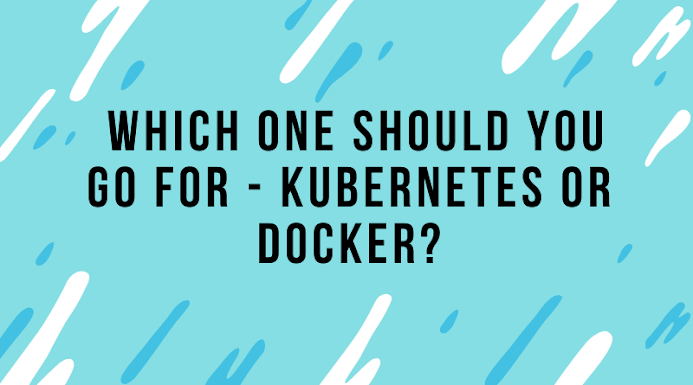The
difference between Kubernetes and Docker is understood better when framed as a
“both-and” question, you need to understand the fact that you did not have to
choose between them. Both of them are different technologies which work
together for building, delivering and scaling containerised apps.
Docker and rise of containerisation
First you need to need what a Docker is. It is basically an open source technology and a container file format that is used to automate the deployment of applications as portable, self-sufficient containers. These applications can run either in the cloud or on premises,
Though the fact of isolating the
environment is not new and various types of containerisation software are
available in the market, Docker has proved to be the default container format
in recent years. Doctor features a Docker engine that allows one to build and
run applications on any development machine. It also lets you share the
container images via container registry piker Docker Hyundai or Azure container
Registry.
Kubernetes
and container orchestration
Kubernetes is an open source orchestration
software that provides you with an API to control how and where all the
containers will run. It enables you to run your Docker containers and
workloads, it also helps to tackle the operating complexities at the time of
moving to scale multiple containers deployed across multiple servers.
What
is Kubernetes actually?
Kubernetes helps you to orchestrate a
cluster of virtual machines. You can also schedule all the containers to run on
those virtual machines on the basis of available compute resources and resource
equipment of each container. These containers are grouped into pods. Pods are
the basic operational unit for Kubernetes online training. You will be able to manage the life cycle of these
containers and pods to keep your apps up and running.
How do Kubernetes and docker differ from each other?
It’s very common to compare Kubernetes with
docker. However a more apt comparison is between Kubernetes and docker swarm.
Docker swarm is an orchestration technology in Docker that focuses on
clustering for docker containers. Docker swarm is tightly integrated into the
docker ecosystem and uses its own API.
The main difference between Docker and
Kubernetes is that Kubernetes runs across a cluster while docker runs On a
single node. Kubernetes is more expensive as compared to Docker swarm. It
coordinates clusters of nodes in an efficient manner. Kubernetes pods are
distributed among the nodes to provide high availability,
Kubernetes
and Docker- better together
While containers promise to code once and
run anywhere, Kubernetes gives you the potential to orchestrate and manage the
container resources from a single control plane. It is great for networking,
load balancing and scaling across all the Kubernetes nodes which run your
containers. There is also a built-in mechanism in Kubernetes like namespaces.
This allows you to group container resources by access to permission, staging
environments and much more. All these constructs make it more easy for the IT
to provide the developers with self service resource access. These also enable
the developers to collaborate on the most common micro services architecture
without mocking up the entire application. Combining these containers with
Kubernetes helps to create a baseline of micro services architecture that
promotes faster delivery and scalable orchestration of cloud native
applications.
So, Kubernetes and Docker can be used together to;
●
Make your app more highly
available and infrastructure more robust. This will let your apps remain online
even if some of the nodes go offline.
●
Make your application appear
more scalable, in case your app starts getting a lot more load and you need to
scale out in order to provide a better user experience, you just need to spin
up more containers or add more nodes to your Kubernetes cluster.
Kubernetes and Docker work best when
together. Docker provides the users with an open standard for packaging and
distributing containerised applications. By making use of Docker, you can build
and run containers and store and share container images. A Docker build on a
Kubernetes cluster can be run easily but Kubernetes is not a complete solution
itself. In order to optimise Kubernetes Production, you need to implement
additional tools and services to manage security, governance, identity and
access along with continuous integration deployment workflows and other DevOps
practices.




0 Comments